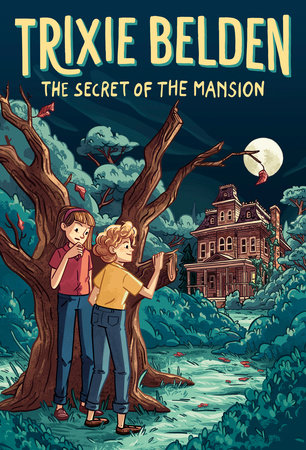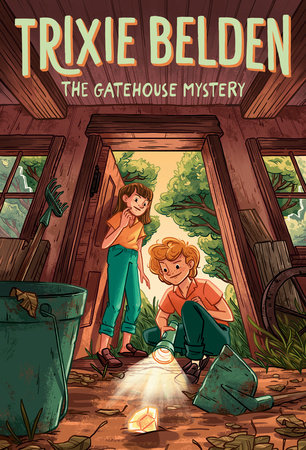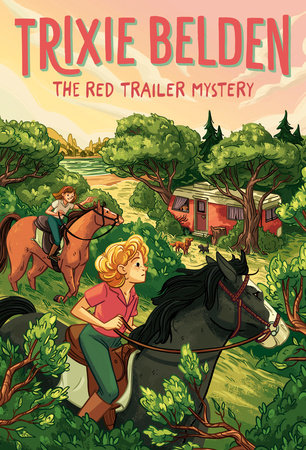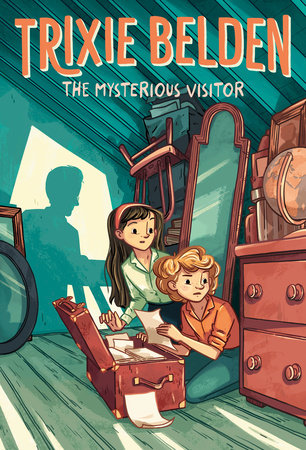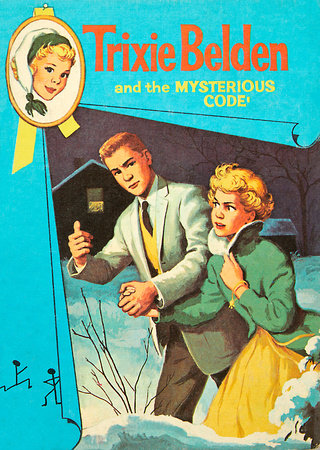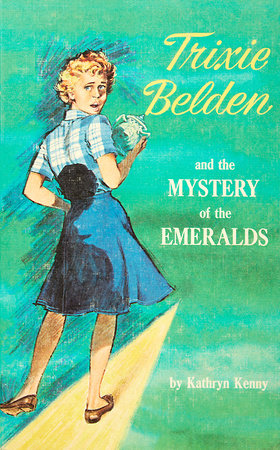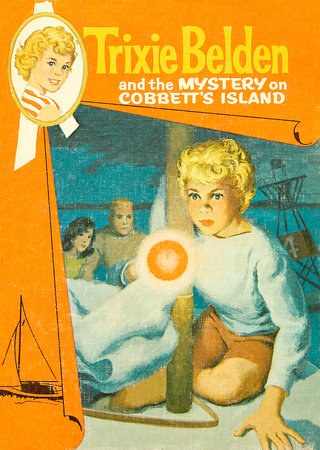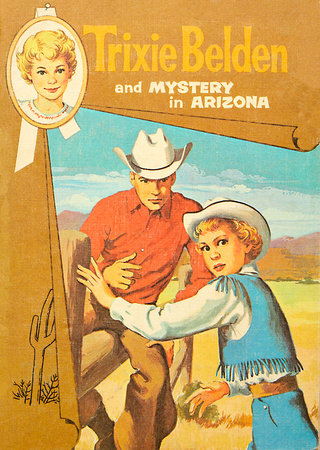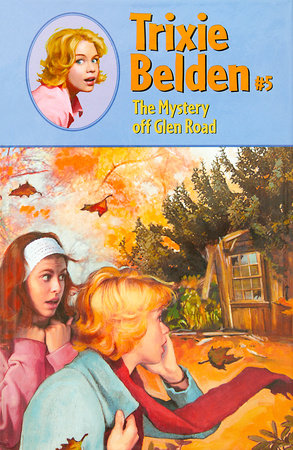Excerpt
The Secret of the Mansion: Trixie Belden
Chapter 1
The Haunted House
“Oh, Moms,” Trixie moaned, running her hands through her short, sandy curls. “I’ll just die if I don’t have a horse.”
Mrs. Belden looked up from the row of tomato plants she was transplanting in the fenced-in vegetable garden.
“Trixie,” she said, trying to look stern, “if you died as many times as you thought you were going to, you’d have to be a cat with nine lives to be with us for one day.”
“I don’t care!” Tears of indignation welled up in Trixie’s round blue eyes. She scooped up a fat little worm, watched it wriggle in the palm of her hand for a minute, then gently let it go. “With Brian and Mart at camp this summer, I’ll die of boredom. I mean it, Moms.”
Mrs. Belden sighed. “You declared you’d suffer the same fate if we didn’t buy you a bike three years ago. Remember?” She stood up, frowning in the glare of the hot July sun. “Now listen, Trixie, once and for all. If you want to buy a horse like the one you fell in love with at the horse show yesterday, you will have to earn the money yourself. You know perfectly well the only reason your brothers could go to camp is because they are working as junior counselors.”
Crabapple Farm, Trixie reflected, was really a grand place to live, and she had always had a lot of fun there, but she did wish there was another girl in the neighborhood. The big estate, known as the Manor House, which bounded the Belden property on the west had been vacant ever since Trixie could remember. There were no other homes nearby except the crumbling mansion on the eastern hill, where strange old Mr. Frayne lived alone.
The three estates faced a quiet country road two miles from the village of Sleepyside that nestled among the rolling hills on the east bank of the Hudson River. Trixie’s father worked in the bank in Sleepyside, and Trixie and her brothers went to the village school. She had many friends in Sleepyside, but she rarely saw them except when school was in session. Now that her brothers, Brian and Mart, had gone to camp, there was nobody but her little brother, Bobby, to play with.
Trixie impatiently kicked a hole in the dust of the path with her shoe.
“It’s not fair. You wouldn’t let me try for a job as a waitress or anything. Maybe I could have gone, too.”
“You’re only thirteen,” her mother said patiently. “Next year we might consider something of the sort. Dad and I are really sorry, dear, that we couldn’t afford to send you to camp this year,” she added gently.
Trixie suddenly felt ashamed of herself, and she impulsively threw her arms around her mother. “Oh, I know, Moms, and I’m a pest to nag at you. I won’t any more. I promise.”
“You can begin to earn the money for your horse right here, Trixie,” Mrs. Belden said, laughing. “There’s plenty to do around here with Brian and Mart away. I’ll pay you something every week if you help me with Bobby and the housework. And I know Dad would be glad to increase your allowance if you do some weeding in the garden every day and take over Mart’s chore of feeding the chickens and gathering the eggs.”
“Oh, Moms!” Trixie hugged her mother tighter. “Maybe I could earn five dollars a week. Do you think I could?”
Mrs. Belden nodded and smiled. “Something like that,” she said. “At any rate, if you really work, I should think you could count on having a horse next summer.” She shaded her eyes with one hand and stared at the car that was just coming into the driveway. “Why, isn’t that Dad now? What could have happened to bring him home from the bank before lunch?”
Trixie had already darted through the gate and was racing up the path from the vegetable garden, calling over her shoulder, “I’ll talk to him right now, and then maybe I can start earning the money for my horse today.”
At the top of the driveway, Mr. Belden backed and turned the car around. Trixie jumped on the running board, shouting, “Dad! Mother said I could earn the money for a horse if I help with the garden and chickens and Bobby. May I? Please, Dad, may I?”
Mr. Belden left the motor running but pulled on the emergency brake. “I guess so, Trixie,” he said, “but we’ll talk about that later. I’ve just been to the hospital,” he spoke to Mrs. Belden as she joined Trixie beside the car. “On my way into the village this morning I found old Mr. Frayne lying at the foot of his driveway. He was unconscious, and I took him right into the hospital.”
“Oh, Peter!” Mrs. Belden cried. “That poor old man living up there all alone! I’ve worried about him so often, but he would never let anyone come near him. He’s probably been sick for days.”
“That’s right,” Mr. Belden said. “He’s suffering from pneumonia complicated by malnutrition. The doctors said there was very little chance that he would pull through.”
“Serves him right,” Trixie said, wiping her grimy hands on her rolled-up blue jeans. “The mean old miser. You should have left him lying in the driveway, Dad.”
Mr. Belden frowned. “Why, Trixie! I don’t like you to talk that way, and you know you don’t mean it. Although Mr. Frayne may not have always been a very pleasant neighbor, he is still a neighbor.”
“I’m sorry, Dad.” Trixie squinted up at the big rambling mansion half-hidden by the trees on top of the hill. “He never seemed like a neighbor to me,” she added under her breath.
As her father drove away, she turned to her mother. “Why, old man Frayne said he’d call the police if he ever caught any of us trespassing. Remember that time he yelled at Mart and--?”
“Now, Trixie,” Mrs. Belden interrupted. “You’re old enough to understand Mr. Frayne’s attitude. He and your father had a disagreement about the boundary line between the two properties. Of course, Dad didn’t want to take the matter to court because nobody really cares who owns that little patch of the woods, but Mr. Frayne insisted. Naturally, when the decision went against him he resented it.”
Trixie pulled up a piece of grass and chewed it thoughtfully. “Well, his game chickens come down on our property whenever they please, and you don’t complain. And just last week, Moms, Reddy chased Queenie, the black hen, into Mr. Frayne’s property. I tore after him because I didn’t want him to hurt Queenie, even though she does belong to the old miser. But I needn’t have worried, because I guess those game hens can take care of themselves. Just as I caught up to them, she suddenly turned and flew right into Reddy’s face, flapping her wings and squawking and scratching like anything.” Trixie laughed. “Reddy was the most surprised Irish setter you ever saw. He tucked his tail between his legs and dashed off into the woods, and just then Mr. Frayne burst out of his house, waving a shotgun and shouting at me. Golly, I was awfully scared for a minute, Moms. He said he’d shoot Reddy if he ever crossed the boundary line again.”
“I’m sorry that happened, dear,” Mrs. Belden said as they strolled back to the garden. “But I honestly don’t think Mr. Frayne would really shoot Reddy.”
“I do.” Trixie kicked a pebble across the path. “He’s such a wrinkled little old man with such a cross face. I bet he doesn’t weigh much more than Bobby does, and in those funny, patched clothes, he looks like a scarecrow. And his land’s in a terrible state. It’s all choked with weeds and vines except for a clearing right around the house which isn’t a lawn any more, because the chickens have scratched it bare.”
“He wasn’t always a wrinkled old man, Trixie,” Mrs. Belden said quietly. “And Ten Acres was once as much of a showplace as the Manor House on the other hill is now. Grief sometimes changes people, you know. Before Mrs. Frayne died, he was a charming old gentleman, and he and his wife were very kind to your father and me when we moved up here from the city. That was before you were born, and Brian and Mart were still babies.” She carefully slipped a cardboard collar around one of the tomato plants. “I’ll never forget the night Mrs. Frayne died. It was a terrible shock to all of us.”
“What happened, Mother?” Trixie knelt in the next row and began thinning the feathery little carrots. “All I know is that she was bitten by a copperhead snake. But you don’t have to die from a copperhead bite. Dad told us all long ago what to do in case any of us were bitten. First, you put on a tourniquet; then you cut into the fang marks with a knife or a razor blade, and then you suck out the blood to keep the poison from spreading. Didn’t Mr. Frayne know what to do, Moms?”
Mrs. Belden pressed the last tomato plant into place with her fingers and stood up.
“I don’t know, Trixie, but he must have been terribly upset. He absolutely adored his wife. She was a beautiful little old lady, and everyone loved her.” She slipped off her gloves and wiped her face with her handkerchief. “It happened one evening when they were sitting out in their summerhouse. The snake must have been curled under Mrs. Frayne’s chair, and she probably kicked it accidentally. When Mrs. Frayne cried out, Mr. Frayne just picked her up in his arms to rush her to the hospital for the antivenin. Naturally, he took the shortcut, and right in the middle of that deserted upper road, the car broke down. Whether he didn’t know what to do, or was too afraid to do anything, I do not know. At any rate, they simply waited there until a car came along. They waited for hours, and, by that time, it was too late.”
“How dreadful, Moms,” Trixie gasped.
Shading her eyes with her hand, Mrs. Belden glanced up at the old mansion on the eastern hill.
“Poor Mr. Frayne,” she murmured. “He was never the same again. He left his car right there on the road where it had broken down and never allowed another automobile on the place after that.” She added slowly, “I wonder what happened to the summerhouse. You used to be able to see it quite plainly from here.”
But Trixie was no longer looking at the Frayne mansion. She was looking in the opposite direction.
“Moms, Moms!” she cried. “Something’s going on up at the Manor House. See all those vans? Somebody must be moving in.”
Mrs. Belden turned and glanced up at the huge estate which bounded Crabapple Farm on the west.
“Why, yes, Trixie,” she said. “I meant to tell you last night, but you were too excited about that horse to listen. A family named Wheeler moved in yesterday. Your father met Mr. Wheeler at the bank. He has a daughter about your age and told Dad he hoped you’d run up and see her.”
“Oh, Mother,” Trixie interrupted excitedly. “Do you see what I see? Horses! Horses being led out toward the stables. Couldn’t I go up right now and meet Mr. Wheeler’s daughter?”
Mrs. Belden smiled. “Well, I guess it’s all right. But what about your job?”
Trixie saw her little brother racing across the lawn with Reddy at his heels.
“I’ll take Bobby with me,” she said quickly, “so you won’t have to worry about him. Come on, Bobby, hurry up.” Trixie pulled open the gate so hard she almost tore it off its hinges.
“Hey!” Bobby shouted as he started down the path to the gate. “Where’re you going? Can I go, too? Wait for me, Trixie.”
The middle of the path was rough with partially exposed tree roots, and Bobby tripped, as he often did, and sprawled in the red-brown dust. Trixie stared at him with disgust. “Oh, Bobby, Bobby,” she cried, “now you’re all dirty. You can’t go calling on rich people looking like that!”
Bobby scrambled to his feet, rubbing the dirt into his moist skin as he tried to brush it off. “Hey!” He grinned. “What rich people? Do I look all right now, Trixie? I wanna go calling on rich people.”
Trixie turned to her mother in despair. “Do I have to take him, Mother? Do I have to?”
Mrs. Belden shrugged her shoulders. “That depends on whether or not you feel a horse is worth working for. You could, of course, finish thinning the carrots instead, and there’s an hour’s dusting to do indoors.”
“Oh, all right, Moms.” Trixie grabbed Bobby’s grimy hand. She was tired of working in the garden, and she despised any kind of housework. “But first I’ll wash you up,” she told the little boy, “and put a clean shirt on you. And for heaven’s sake, Bobby, when you meet these people, don’t tell them I said they were rich, and please try to stop yelling ‘Hey’ all the time.”
Ten minutes later, Trixie and Bobby began the long climb up the Manor House driveway with Reddy racing ahead of them. At the turn in the road, a fat little cocker spaniel rushed down to meet them. Right behind the puppy was a tall thin girl whose pale face was framed in shoulder-length, light-brown hair. She cringed as Reddy, disdainfully ignoring the black puppy, raced around her in circles, barking furiously.
“Don’t pay any attention to him,” Trixie cried quickly, seeing that her new neighbor was really frightened. “He’s just showing off. He wouldn’t hurt a fly. I’m Trixie Belden,” she went on hurriedly. “My kid brother and I live in the hollow in that little white frame house--Crabapple Farm, you know.”
The girl stared solemnly from Trixie to Bobby and back again. “How do you do?” she said, holding out her slender hand. “My name is Honey--Honey Wheeler.”
Trixie shook hands, feeling rather foolish at such a display of formality. Oh, my, she thought, almost sick with disappointment, she’s stuck-up. Who would go around in a white linen dress and stockings and sandals unless there’s a party? Aloud she asked, without much hope, “Do you ride horseback?”
Honey smiled, then. “Oh, yes,” she said. “Do you?”
Trixie shook her head ruefully. “No, but I want to learn like anything. The only thing I have to ride is a babyish old bike. But I’m earning the money now to buy a horse just as soon as I can.”
“A bike?” Honey’s smile widened, and Trixie had to admit that the girl was really pretty in a pale sort of way. “I wish I had a bike,” she said wistfully. “Mother wouldn’t let me have one in the city because of traffic, and the rest of the time I was at boarding school and camp where they’re not allowed.” Timidly she moved a step nearer to Trixie. “I’ll teach you how to ride horseback,” she offered. “Then perhaps you would show me how to ride a bike.”


